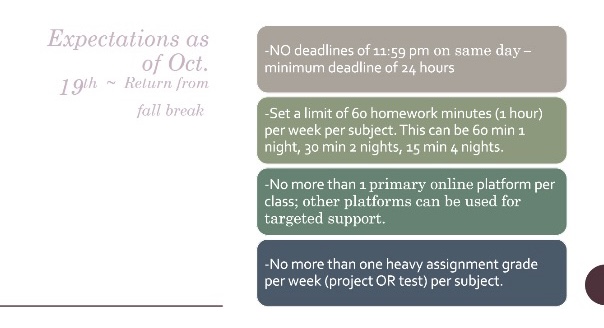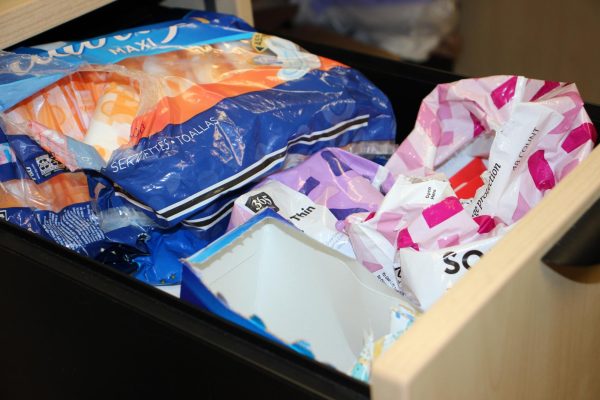New homework policies affect students and teachers
School administration has implemented four new policies which will affect both students and teachers. The policies have been effective since students returned from fall break.
Ahnia Aflaki (10) sighs as she ends her seven hour school day and closes her computer knowing she would have to log back on shortly after to begin her excessive amount of homework. Only after protest from students and parents, teachers must now follow policies that will minimize the amount of assignments students receive and allow for an adequate amount of time to complete them.
These new policies include a minimum deadline of 24 hours, a limit of one hour of homework per week per subject and no more than one heavy assignment grade per week.
“I was really relieved because I felt that it would really help with the homework load and it would take a lot of stress off the students,” Eilene Liu (10) said.
Not only were students grateful for the new policies, but teachers also recognized the importance of the changes.
“I was relieved because I could tell students were anxious about homework assignments, and I appreciated that students would be benefitting from limitations on homework assignments,” humanities teacher Laura Hutchison said.
Many teachers have been following the expectations, but some did not inform their students about the changes. Although unaware of the new policies, Jonathan Mehrotra (9) felt the shift on his own.
“My teachers never mentioned any homework policies to me. I feel like after fall break, the assignment workload became more balanced,” Mehrotra said. “Before fall break, some teachers were giving more homework, but now they’ve switched and it’s more manageable.”
With a smaller, more reasonable amount of assignments, students are able to produce higher quality work, ask questions, receive teacher feedback and, most importantly, learn effectively.
“When you’re stressing over all this homework, you mostly worry about getting it done and not about learning the material. Now that there’s less homework, you have more time to actually learn the material,” Liu said.
Considering the new policies and the shorter class times, a question arises: will students learn enough material? Since the announcement of online school, parents and students have had doubts about whether teachers would be able to include the full curriculum. However, Maridee Cornell, a physics teacher, predicted the difficulties with virtual learning for students before school even started.
“I have spent more time prepping this year than I have the last five years making sure that every one of my lessons are appropriate for virtual [classes] and they are really important to what you need for either college or the AP exam,” Cornell said.
In order to accommodate the new at-home classroom, teachers have changed their normal teaching habits and omitted certain activities as well as unnecessary work.
“The homework [teachers] give is directly related to the material. It’s not like the busy work I’ve had in previous classes,” Mehrotra said.
Previously, students dreaded the looming 11:59 p.m. deadline. Staying up late to finish the overwhelming amount of work was a daily ritual for some students.
“I would stay up really late trying to finish everything. Especially since it was due at midnight, I would have to rush to finish it,” Aflaki said. “I [would] end up not getting much sleep.”
The many hours students spent on screen could be detrimental to physical and mental health. Research from the National Institute of Health has shown that high daily screen time correlates with lower psychological well-being.
“[Before the policies,] it took about three hours a day to finish homework, sometimes more because we had projects. Sometimes teachers gave many assignments for one week, but now the workload has definitely become more manageable,” Mehrotra said. “I’d say right now it’s about two hours.”
Teachers have not yet noticed a change in student behavior, but they hope it will improve student health which is a significant factor in academic success.
“If students are healthier, they might be more alert during class and they might be able to retain information in a better way,” Hutchison said.
No one is certain whether or not these policies will remain when in-person classes restart, but one thing is for sure; student health should always be a top priority.
“I’m hoping this will make things easier for you all to deal with the ins and outs of this virtual world,” Cornell said.
Your donation will support the student journalists of White Station High School. Your contribution will allow us to purchase equipment and cover our annual website hosting costs.






































